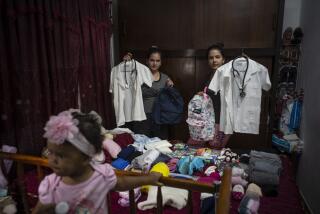Elian’s Father Likely to Come to U.S. Soon
MIAMI — The father of Elian Gonzalez is expected to arrive in the United States--perhaps as early as this week--to take custody of his son in a dramatic step that could signal the end of a bitter international dispute over the 6-year-old Cuban child.
During a third full day of talks Monday between attorneys for the boy’s Miami relatives and the U.S. government, the focus of discussions shifted to the question of how to transfer custody to Juan Miguel Gonzalez, INS spokeswoman Maria Cardona said.
“It’s not a matter of whether we will do this, but how,” she said in an interview. “What we are trying to discuss is how best to effectuate that transfer so that it happens in the most cooperative way possible, in a manner most conducive to Elian’s well-being.”
Gonzalez, other family members and a dozen of Elian’s classmates from Cardenas, Cuba, were among 28 people who applied Monday for visas to come to the United States. State Department spokesman James Rubin said Monday night that the department had approved visas for Elian’s father, stepmother, infant half-brother, a young cousin, his kindergarten teacher and a pediatrician.
Lazaro Gonzalez, the great-uncle who has had temporary custody of Elian since he was rescued at sea more than four months ago, offered no comment as he and a team of attorneys walked out of the federal building in downtown Miami Monday afternoon.
Later, back at the Little Havana home where Elian is staying, Lazaro Gonzalez’s daughter, Marisleysis, tearfully protested the change of custody. “It’s not fair. He’s a human being; he is not a toy,” she said. “If you send Elian back to Cuba, he will be tortured. Is that what this country’s all about?”
The Miami relatives of Elian have been battling to prevent the child’s repatriation, arguing that the deprivation of life in Fidel Castro’s Cuba overrides the rights of a father. Elian’s mother and 10 others drowned when they tried to enter the country illegally by boat.
Manny Diaz, one of the family’s attorneys, spoke only briefly. “We continue to be first and foremost concerned about the mental, psychological well-being of this 6-year-old,” he said. He added that a fourth day of talks “on numerous issues” would take place today.
Word that the Miami relatives may be nearing an agreement to hand over Elian to his father sent a charge through much of this city’s exile community, many of whom have turned the boy into a living symbol of their anti-Castro fervor. “They would have to go over the bodies of all of us Cubans who are here,” said Maria Gonzalez, no relation to Elian, one of about 100 people who spent the day in front of Lazaro Gonzalez’s Little Havana home. “They would have to kill us all.”
Other exiles outside the house practiced linking arms to form a human chain--a maneuver they have threatened to employ to prevent authorities from removing Elian.
Local police will not be used to take the child from the home, elected officials here have vowed. But police do promise to keep order. As additional crowd-control barricades were trucked into the neighborhood Monday, Miami Police Chief William O’Brien toured the area. He said that officers were preparing for demonstrations that would “allow those deep emotions to be vented while maintaining public safety.”
Florida Gov. Jeb Bush also has been in touch with local officials about their plans to control any demonstrations that may erupt if Elian were to leave the city.
It is unlikely that Juan Miguel Gonzalez would come to Miami. Rather, he would likely fly to Washington, where the Cuban government maintains an Interests Section.
Elian and those arriving from Cuba could stay at the Interests Section, or at the Maryland home of Cuba’s chief diplomat in the U.S., for several weeks until a federal court rules on his relatives’ case for keeping him here. Lazaro Gonzalez has appealed a Miami judge’s decision that affirmed Juan Miguel Gonzalez’s custody rights.
Castro indicated last week that he wants the whole group to stay in the United States to help Elian readjust if the courts or other problems delay his return to Cuba. Castro even suggested that Elian’s school desk would be shipped over as an aid to his family reintegration.
Some U.S. officials interpreted the Cuban leader’s plan darkly.
“How can we explain to the American public and press that the Cuban delegation wants to put in an official indoctrination center?” one official said. “Instead of Moscow on the Hudson, it would be Havana on the Potomac.”
U.S. authorities said they would urge Juan Miguel Gonzalez to stay in the United States throughout the appeal process, which could last into May. Cardona noted that the father “has said publicly he would be willing to do that.”
Cardona said Monday that the plan to place Elian in his father’s custody negates the need to revoke his parole status. The government had threatened to do so if the Miami relatives did not agree to certain concessions by today, including a pledge that they will turn over the boy once their appeals are exhausted.
Under the new strategy, she said, temporary care of the boy will be transferred from Lazaro Gonzalez to Juan Miguel as soon as the father arrives in the United States--with or without the relatives’ agreement.
“What we are not willing to do is to wait this out for an open-ended process that would contribute to additional weeks and months of separation from his father,” Cardona said.
But what if Juan Miguel does not end up coming to the United States?
“We’ll cross that bridge when we come to it,” she added.
Gregory Craig, a lawyer who represents Elian’s father, said earlier Monday that he expects Gonzalez to come to the United States quickly. “We really don’t think there’s any excuse for any more delay between the time these two can be reunited,” he told a television interviewer.
Meanwhile, Elian skipped school Monday to play in the side yard of his great-uncle’s home--at times with playmates his own size, and for a while with a frequent visitor, Donato Dalrymple, one of two fishermen who plucked the child from the sea on Thanksgiving morning.
Before dozens of spectators--most of them Cuban Americans who favor the boy’s staying here--Elian played on a swing while holding a small white rabbit. On the wooden swing support were written the words, “El Parque de Elian”--Elian’s park.
Times staff writers Bob Drogin and Eric Lichtblau in Washington contributed to this story.
More to Read
Sign up for Essential California
The most important California stories and recommendations in your inbox every morning.
You may occasionally receive promotional content from the Los Angeles Times.










